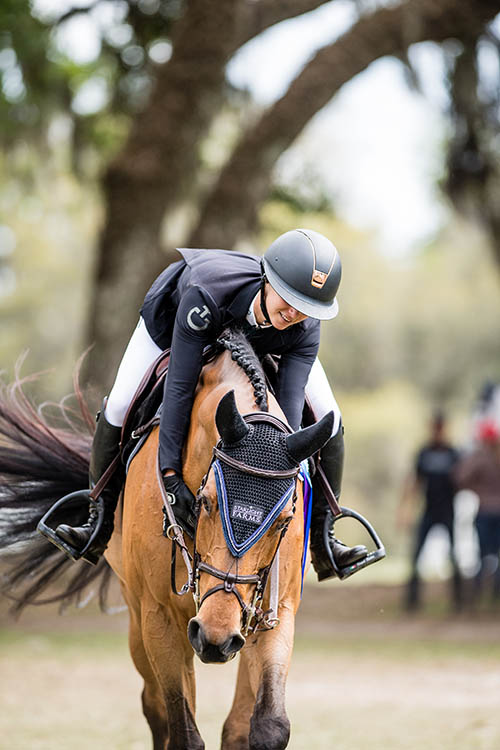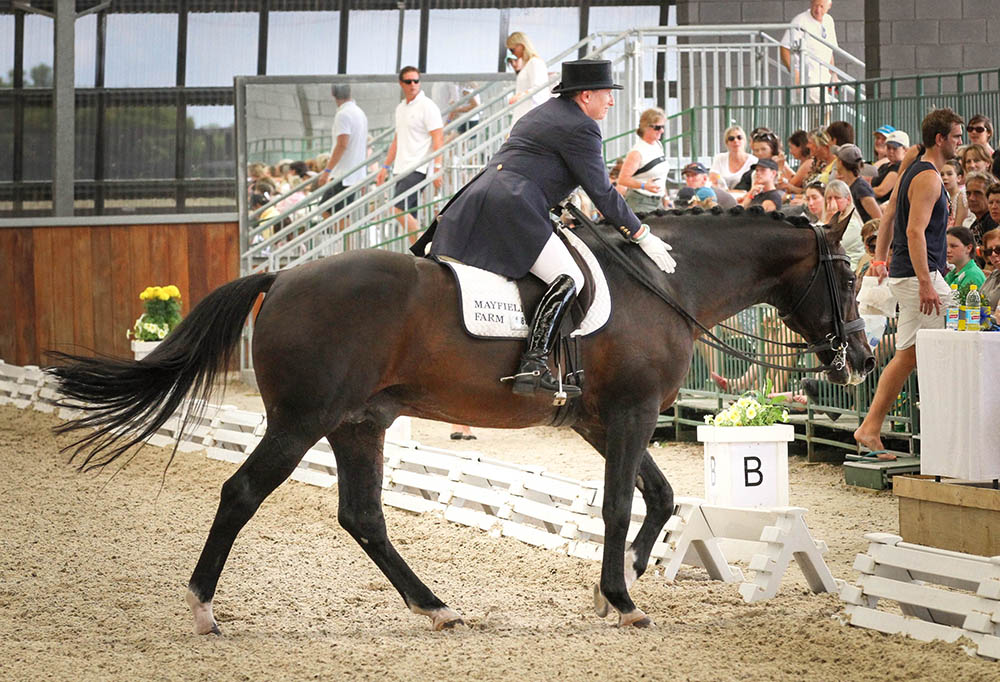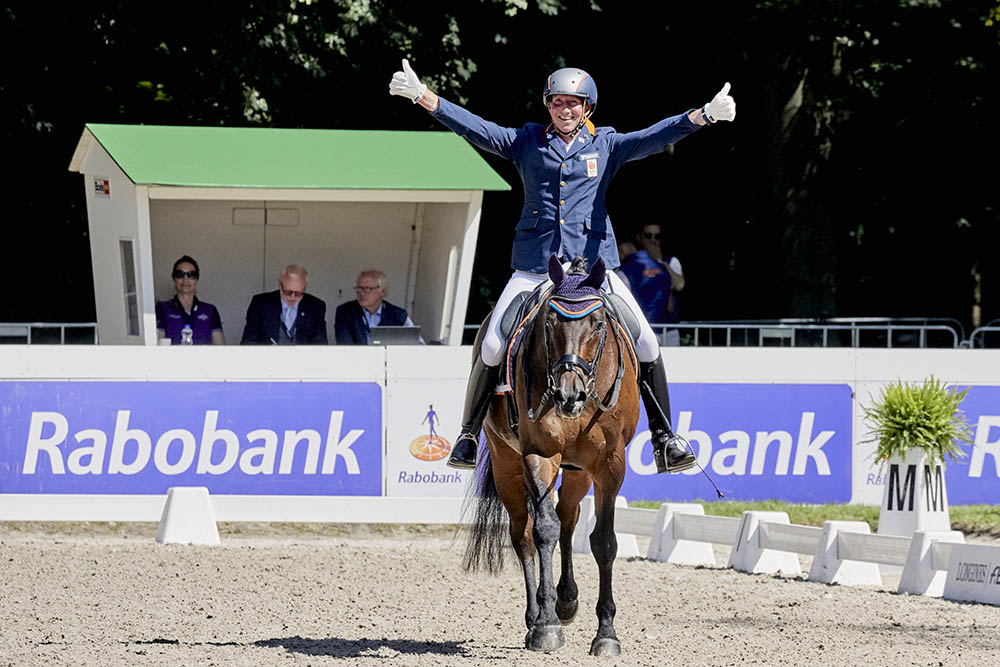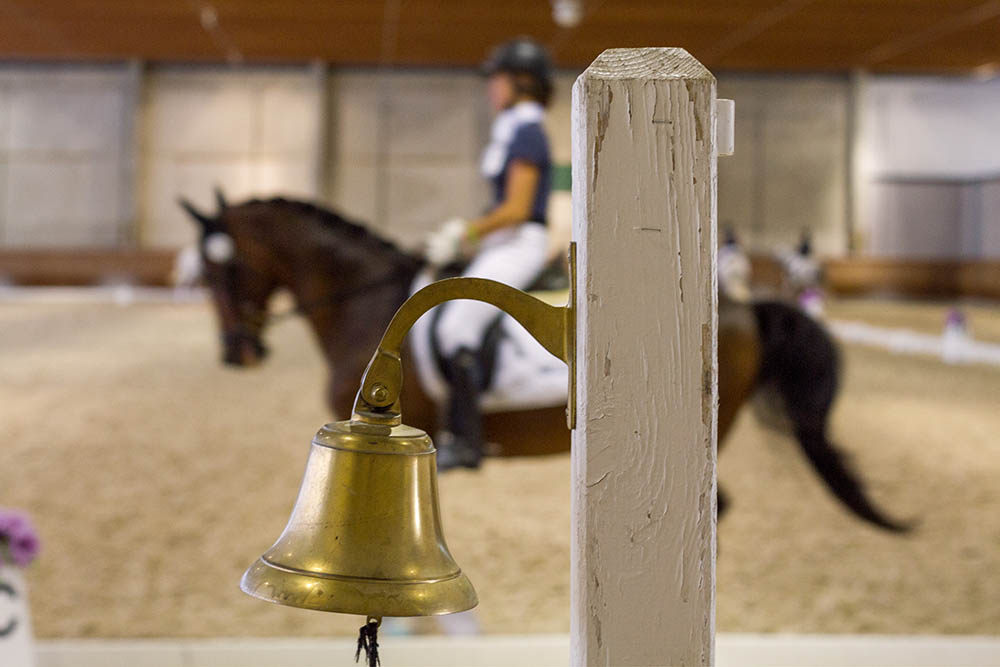It’s the time of year for indulging, so I thought I would indulge in another short discussion about relationships. To my mind it is relationships that bring meaning to our lives.

“The more sensitive you
are to your horse, the more
sensitive he will be to you.”
For some of us the relationship with the horse is the main thing that keeps us involved with the sport. And then there are the relationships that we have with our friends, coaches, and in dressage there is the relationship we have with the judges. Of course, there is a huge body of research that can inform our thinking about relationships. We can think about our equestrian relationships in the context of these relationships.
We start to learn about relationships right from the first weeks of life. The template for all relationships is the relationship we have with our mothers or primary care giver. This is true for all mammals, who can only survive if they have a carer. Often mothers come to the important job of parenting wanting to do it perfectly. They want to meet their new baby’s needs so well that the baby has minimal discomfort. The feed is ready as soon as the baby wants it; the mother is available as soon as the baby wakes up.
When this relationship is working well, the baby comes to know in his being that he can safely explore the world with Mum’s support; that she provides a secure base for exploration. And the baby knows that she is the safe haven he can return to if he is frightened, tired, or just needs a top-up of the sense of connection. These are the hallmarks of secure attachment, the gold standard of relationships that we want for our children.
However, what the research shows us is that actually babies can do very well psychologically, even when mothers match their babies’ needs over 30% of the time. The other up to 70% needs to follow the principles of “rupture and repair”. When the mother does not deliver what the baby/child needs in a timely fashion, or when the mother is tired, grumpy or otherwise involved in normal life (rupture), then ideally the rupture is noticed and repaired. Repair might mean a soothing acknowledgement or a cuddle and meeting the need. This pattern of rupture and repair is absolutely fundamental to ALL of our relationships. Good relationships are those where misunderstandings and mis-attunements are negotiated easily and repaired. This is true for all our relationships.
Luckily for us, I believe that horses generally are very forgiving of our mis-attunements. They are not so forgiving if we frighten them because they are so aware of danger and potential threats, but generally they are very tolerant of us being much less sensitive to how they express themselves than they are to us. Attunement is reciprocal. In my experience, the more sensitive you are to your horse, the more sensitive he will be to you.
Those of us who have enjoyed years’ long relationships with the same horse will have experienced the way a horse will seem to know what you want before you ask it. You can teach a horse to be more sensitive by asking with a light aid and being very quick to release pressure when he responds, or when possible use the positive reinforcement of a treat. Try to stop him only with your weight. When he slows reward him. You can start with the groundwork. A touch with a finger, or pressure applied with only your posture, and removing the pressure and rewarding him.
Trust is one of the foundations of any relationship. When we behave in a predictable and kind way, trust in us develops. We need to feel safe to have trust. A horse, being a flight animal, is quick to feel fear, and so quick to lose trust. Trust becomes more secure when ruptures are repaired. Trust can be quite fragile. One angry slap in the face, or a rough hand on the rein that punishes a horse, can wreck trust in a moment. This is true when it is applied to your horse’s trust in you, or anyone else’s trust.

“A horse, being a
flight animal, is quick
to feel fear.”
Once trust is broken it will take time to earn it again. Having acted in an untrustworthy way once, you will need to have many repetitions of being a safe companion in order to restore trust. This is rupture and repair in action. Of course, the greater the breach of trust the harder it is to restore. I think probably all of us have somewhere in our equestrian journey handed out harsh treatment to a horse in anger, or even accidentally. He steps on your foot and you scream in pain and slap him on the head to move him quickly.
One of my lowest moments as a younger rider was after being “spat out” by a youngish showjumper, hitting him across the front legs before I even got off the ground. Not a good look. One of the lessons we learn if we are truly aspiring to good horsemanship is a high degree of emotional regulation, and I can tell you it does improve with time and diligence. Having a good capacity to regulate your feelings and stay calm at all times will help your horses to feel safe with you and have that secure trusting relationship that we want. This will help them when going into the water or over the bridge on the trail they haven’t seen before, or stay paying attention to you in the big arena at the competition. If they are frightened of the “stuff” and frightened of you, they are likely to be less reliable than if they can use your presence to make them feel safe and secure.
What has this got to do with dressage judges? Well, I think that often riders find it hard to trust the judges; there is a lot of rupture and very little repair. There is rupture when you, the rider, feels hard done by in terms of your score, there is rupture when there is a discrepancy in the score (even though as Roger Fitzhardinge wrote in a previous Equestrian Life article, the discrepancy could reflect the physical position of the judge around the arena and their different view point).

“As judges are people
too, they will be biased.”
We know from the experiments with conscientious objectors, that if you put people in a position of power and control it changes them to be more punitive. Dressage riders spend hours doing their best to train the horse for the minute requirements of the test. We are very invested in the result. Judging is a very complex task requiring hundreds of little decisions so quickly that it has to include a lot of right brain intuition and can’t be done with left brain logic. Judging requires courage; to have an opinion and express it. Judges are not always kind. Actually, it’s not their job to be kind. Judges are biased. Actually, we are all biased. A Nobel Prize was awarded to people who researched the bias we all have, and as judges are people too, they will be biased. This is not a criticism, just a fact.
Judges make mistakes, actually all of us do. I had a judge ring the bell three times for an error of course when actually I was correct. Was there repair? A sincere apology? No. Quite often the judge may be correct, but as a rider we can feel hurt or aggrieved, because we think it was better than it was, or there was something we didn’t know. Who knew that the rein-back had to be more collected? What does that mean? I thought the rein-back I did was good; it was fluent, straight, rhythmical. I felt aggrieved with a low score for what I thought was a good rein-back. A judge helped me to understand that I had missed something. If the rein-back is collected, the horse stays in a collected posture, his shoulder and his back stays up and his abdominal muscles are engaged. This is what repair looks like. I felt hard done by, so I approached the other person and we had a conversation where we each listened to each other’s point of view and came to an understanding. So now I am more able to get that high mark I want.

“Put your listening
ears on before you
approach a judge.”
Our sport would be better if we worked to build better relationships between judges and riders. If we made more opportunities to listen to each other. I would encourage riders to approach judges to talk about the results and understand how these decisions are made. Take a video of the tests if you have it. Put your listening ears on before you approach a judge and don’t go while you are too angry to listen. Be genuine about it. Judges report that they feel riders can be abusive, and of course that ruptures the relationship and will contribute to a sense of mistrust.
Protocol training, where the judge gives feedback on a ride done out of competition, is a great way to build a relationship where there is a sense of working together. I had the opportunity to do this by video in the lockdown and it has really helped, and added to my enjoyment and my scores. If you are a judge, also put your listening ears on when approached by a rider. This will be especially important if an angry rider does approach. A feeling will diminish if it is expressed and understood by another person. Own your mistake and apologise if you made a mistake. It’s okay. No one is being sued for a wrong dressage mark. We are not saving the planet here.
Let’s work together to add to our collective sense of relationship and connection, to help us all enjoy the sport more.
I wish you all a happy and connected holiday season. EQ
Read more by Dr Kerry Mack:
Whipping Up Controversy – Equestrian Life, December issue
The Importance of a Trusting Relationship – Equestrian Life, November issue
Welcome to Kindergarten for Foals – Equestrian Life, October issue
The Carrot or the Liquorice? Positive Reinforcement – Equestrian Life, September issue
Submission or Stress? Something to Chew On – Equestrian Life, August issue
A Relaxed Horse is a Happy Horse – Equestrian Life, July issue
The Literate Horse Rider – Equestrian Life, June issue
Why Horses Love Ingrid Klimke – Equestrian Life, May issue

